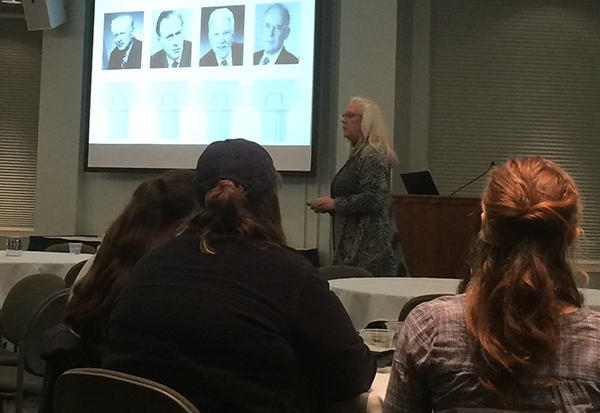 Tamara Gillis says communication is not about ourselves, but rather “the other.”
Tamara Gillis says communication is not about ourselves, but rather “the other.”
After more than 30 years of corporate communications research and of how people communicate and receive messages, the Elizabethtown College professor of communications has learned that companies need to be selfless in their public relations. “It’s not necessarily about the latest technology or ourselves; it’s about the other person,” Gillis said.
At her Faculty Lecture Series presentation Tuesday, Feb. 8, Gillis emphasized that if attendees took anything from her lecture, it was that “all communication is about the receiver.” Her presentation also covered the positives and negatives of corporations using social media
To drive her message home, Gillis provided an anecdote from her days in marketing at a York County hospital where a coworker demanded she make a video and brochure to advertise blood donations. When Gillis asked why the hospital needed those specific formats, the employee replied that their competition, a much larger hospital, had advertised that way.
…all communication is about the receiver.”
Instead, Gillis contacted local media, encouraging them to report on the CEO and CFO of the hospital donating blood. This showed the public how painless donating blood could be and got the message to its intended audience.
“We live in a world where we are saturated with media,” Gillis said. “Organizations constantly struggle deciding what media to use.” So, copying the competitor, as her previous coworker wanted to do, is not necessarily the right move. The organizations’ audiences could be vastly different.
Gillis said she has worked with several professors and students on communication research, including Kristen Johnson, fellow communications professor. From 2012 to 2015, the pair researched various companies and their successes with social media. They also examined how journalists use social media to gather and report news.
Another research project, conducted with E-town students David Shatzer ’14 and Abigail Piskel ’16, focused on sustainability in organizations’ communication practices.
This research and her own experiences have translated back to the classroom, where Gillis takes, anonymously, cases of previous clients and creates a simulation project for her students to solve. “It’s nice to have it start with a real problem,” Gillis said.
The Tuesday evening presentation is part of the College’s Faculty Lecture Series, which gives faculty members the opportunity to showcase their own research to colleagues and students. The office of the Senior Vice President for Academic Affairs and Dean of Faculty sponsor the event.

